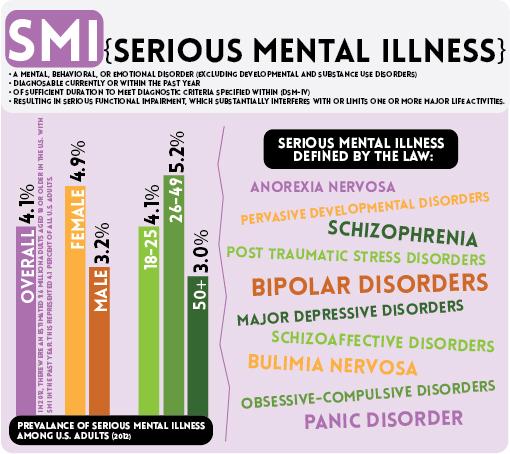In reality, mental illness afflicts members of society from all walks of life – far from something only “different” students struggle with. College students everywhere battle with various forms of mental illness including depression, bipolar disorder, anxiety, eating disorders, obsessive-compulsive disorder and attention-deficit hyperactive disorder, just to name a few.
According to the National Survey on Drug Use and Health, in 2012, there were an estimated 9.6 million adults aged 18 or older in the U.S. with various forms of serious mental illness.
These varied versions of illnesses can have long-lasting and crippling impacts on those they affect.
According to “College Students Speak: A Survey Report on Mental Health” from the National Alliance for the Mentally Ill, women are two times more likely than men to experience depression during their lifetime. Depression was the highest-represented mental health condition among the students in the survey.
Erica White, a professor in the department of psychology at the University, said spotting the signs of mental health issues is beneficial.
“If a person is behaving in a way that is inconsistent with developmental, cultural and societal norms, they are experiencing emotional distress and they are not able to manage daily responsibilities and functions, there is cause for some concern,” she said. “If you are someone you know is experiencing emotional or psychological distress, seek help. Do not suffer alone. There is help.”
Fortunately for UA students, there is help.
The UA Counseling Center provides students a safe haven where they can discuss issues they may be facing related to emotional or physical health. The counseling center offers screening and evaluation, individual counseling, psychological assessments and other services to students. The Counseling Center is able to provide up to 15 counseling sessions per academic year at $15 a session and can be completely confidential, if the student so chooses.
Lee Keyes, executive director of the Counseling Center, said he believes the community needs to make awareness of mental health just as important as CPR. He said awareness of mental health can save and improve lives just as CPR does.
Keyes also said it is impossible for one to respond in an appropriate way to handle a situation if they are not aware of the proper steps to take.
“Watch out for yourself and for your friends,” he said. “Stand up and speak out when you are concerned. Help others get help, and do so early; do not delay. Most students begin to feel better after just a few visits [to the counseling center], so it does not take long.”
In addition to the Counseling Center, students have access to other options on campus. These include the Betty Shirley Clinic at the University Medical Center, the Student Health Center on campus and the UA chapter for the National Alliance for the Mentally Ill.
“Friends and family can have a huge impact on a person’s recovery or stabilization,” said Elise Goubet, a recent UA alumna and former president for the UA NAMI chapter. “One of the strongest predictors of suicide is loneliness and sense of burdensomeness – so even just making sure your friend or family member is loved and appreciated can make a huge difference. Mental illness is incredibly prevalent so this is an important issue for everyone.”
NAMI has existed since 1979 and is now the nation’s largest grassroots mental health organization.
The Betty Shirley Clinic at the University Medical Center offers unlimited visits to students who may need help and offers psychiatric services. Goubet said many students do not realize that the Office of Disability Services also offers services for those with mental illness.
Along with the services the ODS and the Betty Shirley Clinic have to offer, the Student Health Center wants students to be aware of the signs of mental illness.
Margaret Garner, interim executive director at the Student Health Center, said the demand for counseling is on a dramatic upswing.
“We don’t know how many students are affected by mental health concerns or illness; some are silent and able to hide signs,” she said. “Counseling centers in the U.S. have reported a dramatic upswing, as much as over 50 percent in the past 10 to 15 years, in the demand for their services.”
Garner said it is important for the community to begin a conversation.
“What can the campus community do?” she said. “The best answer is begin with the simple truths – be a friend you would want to have. Listen, show you care, encourage this friend or acquaintance to seek help from campus resources, avoid judging, be an encourager for getting help. You may never know just how much this can mean to someone who is hurting inside.”









